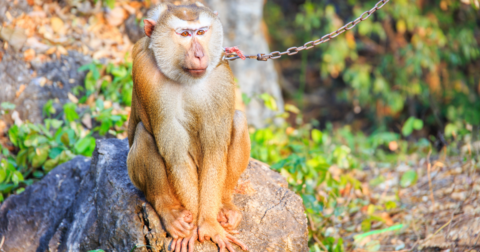Feature
Cattle Raised for Beef Are Heavier Than Ever, Raising New Concerns in the Industry About Animal Health and Welfare
Food•2 min read
Explainer
The plant-based milk might be more environmentally friendly than dairy — but that doesn’t make it automatically ethical.


Words by Seth Millstein
Over the last decade, coconut milk has become an increasingly popular alternative to dairy milk, and market analysts project that its sales will continue to grow. But while it may sound like a perfectly innocent plant-based product, it has a dark underbelly that’s rarely discussed. In many places, coconut farmers imprison monkeys and use abusive measures to force them to pick coconuts.
Several coconut brands and retailers have stopped selling coconut milk that comes from coconut farms that force monkeys to collect coconuts. But the practice is ongoing, and as one of the lesser-known forms of animal abuse in food production, it’s worth spending some time looking at exactly how the process works, why it’s used and how widespread it is.
The fact that monkeys — pig-tailed macaques, to be specific — are used to collect coconuts isn’t a secret. Farmers in Southeast Asia have been using them for this purpose for centuries, and there are entire schools dedicated to training monkeys to pick coconuts and fruit. Even the industry insiders who dispute allegations of abuse acknowledge the fact monkeys are used in this way.
Until recently, however, the fact that these animals are abused and forced to collect coconuts as part of the process was not widely-known. The Daily Mail ran a report on the phenomenon in 2013, and two years later, the animal rights group Animal Place followed suit.
In 2019, the issue drew international news coverage following an investigation by PETA Asia. The organization visited eight Thai coconut farms, and reported that all of them were using and abusing monkeys as part of their coconut-picking process. The organization conducted two follow-up investigations over the next several years, both of which confirmed that the practice is still going on.
In totality, PETA Asia says that it visited 57 coconut farms in southeast Asia on which monkeys were being abused, and published footage and photographs of this abuse.
The reason coconut producers use monkeys is simple: efficiency. Coconuts grow on trees, and retrieving them requires either climbing the tree or somehow jostling them free from the ground — for instance, by using a long stick to poke them. Because the trees can grow up to 100 feet tall, both of these methods are challenging and dangerous for humans.
But pig-tailed macaques have a much more nimble time, as they’ve evolved to scamper up and down trees with ease. According to NPR, a male monkey can collect up to 1,600 coconuts a day, whereas a human tops out at around 80.
The practice is believed to be the most widespread in Thailand, a major exporter of coconuts around the world. Sri Lanka, Malaysia, India and other nearby countries have also been known to use monkey labor to collect coconuts, according to NPR, but it hasn’t been confirmed that they’re used in the same manner as in Thailand. Some coconut-producing regions, such as Hawaii and Brazil, aren’t home to pig-tailed macaques in the first place, and so monkey labor isn’t used by domestic coconut producers.
At its core, the practice is straightforward. Coconut producers first train monkeys to climb trees and collect coconuts, and then force them to do so. The monkeys are chained or leashed to prevent them from escaping, both while working and on their off-hours. Some footage of coconut farms shows the monkeys being beaten, whipped and yanked by the neck by coconut farmers, while other footage depicts them living amongst garbage, tied to fences, or being transported in small metal cages. Although macaques do eat coconuts, they’re not allowed to eat any of the ones that they collect.
According to PETA’s investigations, producers will often kidnap the monkeys when they’re babies, separating them from their families in the process. Alternatively, they will sometimes breed them on site.
Not all brands use monkey labor. But many of the major ones do.
According to PETA’s investigation, the following companies source coconuts from Thai farms that use monkey labor:
After PETA’s investigations, a host of stores said that they would no longer sell coconut products from Chaokah, including Target, Wal-Mart, Costco, Walgreens and many other major retail outlets.
Because monkey labor is so common in Thailand’s coconut industry, some companies have stopped selling any Thai-produced coconut products altogether. One is HelloFresh, the meal subscription service, which announced in 2023 that it would no longer include coconut milk from Thailand in its products. Another is ASDA, a supermarket in the United Kingdom, which began using coconut milk made in the Philippines around the same time in lieu of Thai-produced coconut milk.
The Thai embassy claimed in 2022 that 25,000 stores across U.S. and Europe stopped selling Thai-made coconut products after PETA’s investigations, according to the New York Times.
In addition, some producers of coconut milk have opted not to source coconuts from Thailand. Those brands include Trader Joe’s and Raley’s, both of which sell their own store brand coconut milk, as well as several others listed below.
According to PETA, the following companies sell coconut milk that isn’t sourced from Thailand, and should be safe from relying on monkey labor.
Chaokah hasn’t publicly weighed in on the matter, and refused requests for comment by PETA and the New York Times.
However, some people disputed either the veracity of PETA’s findings or the extent and severity of the problem. One is Arjen Schroevers, who lives at a monkey training school in Thailand and is the son-in-law of a prominent monkey trainer. In 2020, Schroevers wrote an open letter in which he vehemently rejected almost all of PETA’s claims, and claimed that coconut-collecting monkeys in Thailand are treated humanely and never struck or beaten. He also denied that macaques are taken from their parents as newborns.
Leslie Sponsel, a former professor who studied human-monkey relationships in Thailand, also denies that monkeys are abused in the Thai coconut industry, telling NPR in 2015 that he “never observed or heard of cruelty or abuse of the monkeys” while in the southern part of the country.
It’s worth noting that, although they object to the word “abuse,” both Schroevers and Sponsel acknowledge that Thai coconut producers keep the monkeys tied up, meaning it is forced labor. Schroevers told NPR that the monkeys are tethered to keep them from escaping, while Sponsel said that they’re “kept on a chain tethered to the handler or to a shelter while not working.” Schroevers further said in his open letter that “of course” the monkeys are confined to tight cages during transportation, as that’s the “safest and easiest” way to move a monkey.
It’s often difficult to determine with certainty whether a certain brand of coconut milk used monkey labor in its production, and because of this ambiguity, some people have foregone coconut milk altogether in the name of more ethical types of milk.
Due to the horrid conditions that dairy cows are forced to endure, cow’s milk isn’t any better for animal welfare than coconut milk, and is certainly worse for the environment. But plenty of other plant-based milks are both animal-friendly and more environmentally sustainable than dairy milk.
Soy milk and oat milk are among the most sustainable milk options, but almond milk, hemp milk, rice milk, hazelnut milk and even pea milk are also excellent cruelty-free milk alternatives with a small environmental footprint.
Though coconut trees sequester carbon, producing coconuts is extremely land-intensive and is a leading cause of deforestation in some countries. It’s also harming animals besides monkeys: coconut plantations have been linked to the potential extinction of two species (the Marianne white-eye, a bird, and Ontong flying fox, a type of bat), and one study found that 66 species on the IUCN Red List are impacted by coconut production.
As far as coconut milk goes, the most reliable way to make sure you’re not contributing to forced monkey labor is to not buy coconut products made in Southeast Asia, and especially avoid coconut milk from Thailand.
In a broader sense, this issue highlights the fact that food production often harms animals in ways that aren’t immediately obvious. Palm oil is another example of such a product; despite being a plant-based product, the chemicals used on palm oil plantations are poisonous to monkeys, and have killed off baby macaques at an alarming rate.
Just because a product seems animal-friendly doesn’t mean it is, and plenty of foods have dark sides that aren’t intuitive to grasp at first. The first step to finding a diet that aligns with your own ethics is to learn where your food comes from, and how it’s produced.
This piece has been updated to remove use of the world “slave” and “enslaved.”
Correction: An earlier version of this story included the brand Edward & Sons. After publication, a representative from Edward & Sons reached out to Sentient to say the company does not source coconuts from farms that use monkey labor. One of the company’s suppliers does source from other farms, however, and does supply those coconuts to other brands. As Edward & Sons does not source from those other farms, we have decided to remove their name from the story.